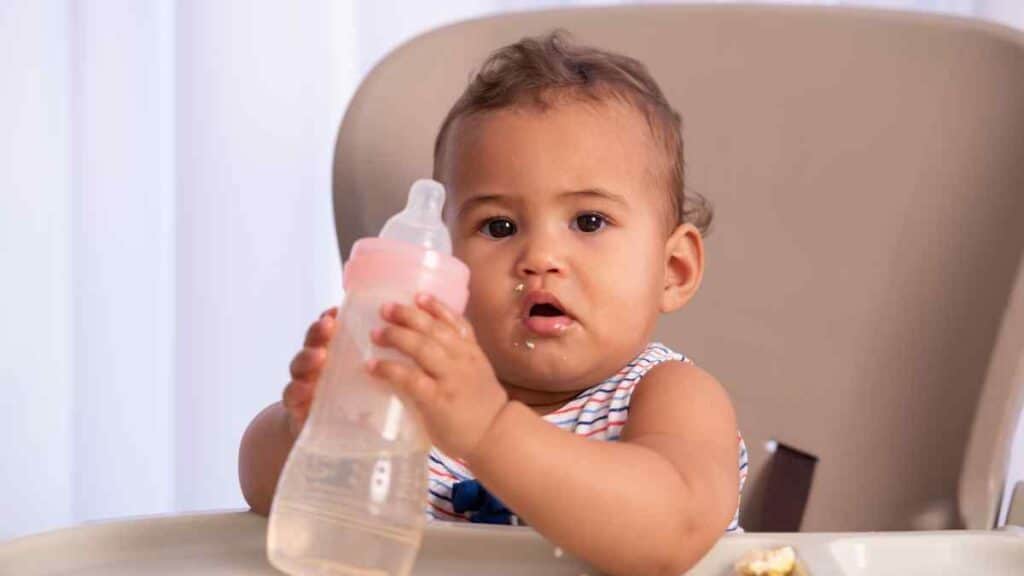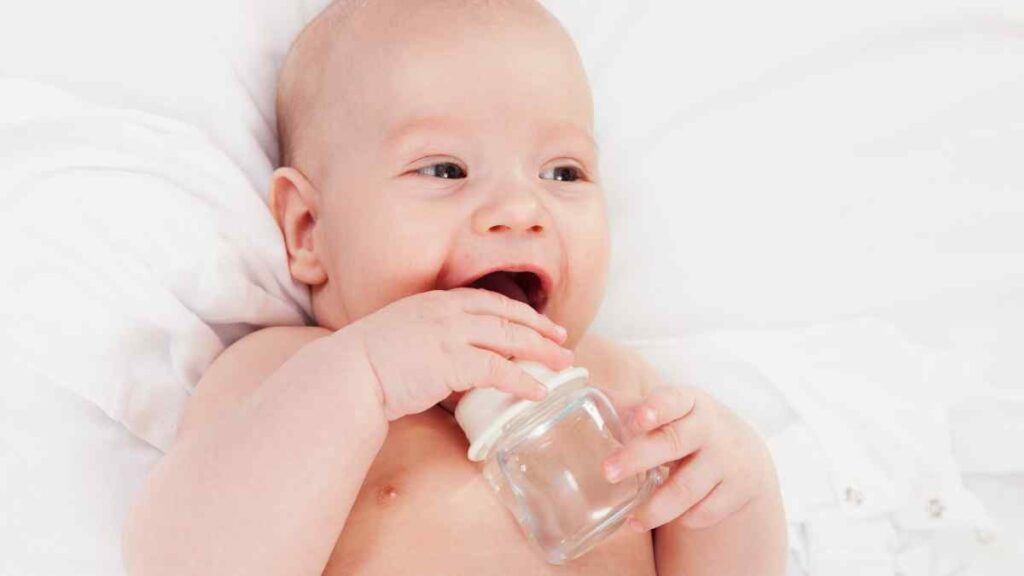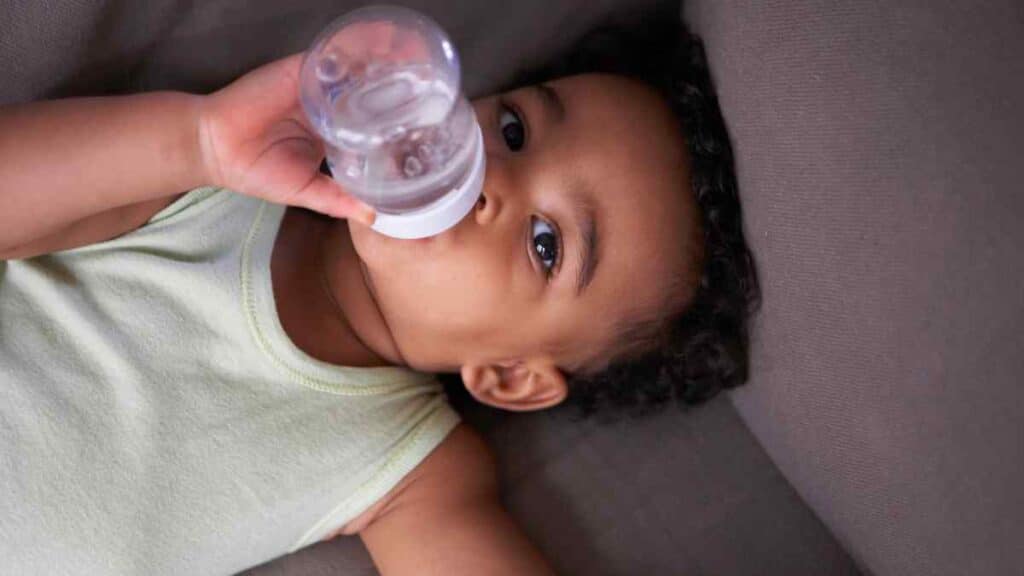Water is essential to life. It keeps us hydrated, flushes out toxins, and even aids in digestion. As adults, we’re advised to drink a significant amount each day for optimal health. But when it comes to babies, the guidelines drastically change. Parents and caregivers are often perplexed when told not to give water to their newborns. Why can’t babies drink water? Is it not as crucial to them as it is to us?
The answer lies in the unique physiology of infants and the potential risks that giving water to babies can entail. This article aims to clarify why healthcare providers caution against giving water to babies, exploring the potential dangers and discussing when and how it’s safe to introduce water into an infant’s diet. Understanding this topic is not merely a matter of curiosity—it’s a critical aspect of ensuring a baby’s health and well-being.
So let’s dive into the intricacies of infant hydration, the risks, and benefits of water intake in the early stages of life.

The Physiology of Infants
The digestive system of an infant is unique and quite different from an adult’s. In the early months, babies depend solely on breast milk or formula for all their nutritional needs, which includes hydration. These provide the right balance of nutrients and fluids that babies need for healthy growth and development. Giving them anything extra like fruit juice, cow’s milk, or even purified water can disrupt this balance, leading to potential health issues.
Contrary to common questions such as ‘can babies drink purified water?’ or ‘can babies have distilled water?’, it’s important to understand that young babies should not drink water by itself. They get all the hydration they need from breast milk or formula, and introducing water too early could cause a condition known as water intoxication. This happens when water dilutes the essential nutrients in the baby’s bloodstream, leading to electrolyte imbalances and even brain damage in severe cases.
Kidney Function in Infants
Another crucial aspect of an infant’s physiology is their kidney function, which significantly differs from adults. The kidneys are responsible for filtering waste and maintaining the right balance of water, electrolytes, and other important nutrients in the body.
In the case of young babies, their kidneys are still immature and lack the ability to filter and excrete excess water effectively. So, giving your baby water, especially in large amounts, can overwhelm their kidneys and disrupt the delicate balance they maintain. This can result in a serious condition called hyponatremia, where the sodium levels in the baby’s blood become dangerously low.
Choosing Water for Babies: Purified Vs. Distilled
Once young babies reach an age where they can start drinking water—usually around 6 months—parents often ask what kind of water is best for their babies. The questions range from ‘is baby water distilled?’ to ‘purified vs. distilled water for babies,’ and ‘do babies need distilled water?’.
The American Academy of Pediatrics suggests using either fluoridated tap water or fluoride-free water to prepare baby formula or any water source that you deem safe [1]. Both distilled and purified water can be used as they are usually free from harmful microbes and contaminants, but they might not contain the necessary minerals that tap water provides.
Distilled water goes through a process of boiling and condensation, making it free from most impurities. Purified water, on the other hand, could come from any source but has been purified to remove chemicals and pathogens. Despite the different processes, purified and distilled water are similar in terms of safety and can be used interchangeably for babies, especially when preparing infant formula.

The Risks of Giving Water to Babies
Water intoxication, though rare, is a potentially serious condition that can occur if babies are given too much water. This condition arises when an excessive amount of water dilutes the concentration of sodium in the body, disrupting brain function.
While adults can handle larger quantities of water, babies’ kidneys are not mature enough to process a significant volume efficiently. Even if we’re talking about purified or distilled water, the answer to the question, ‘can babies drink distilled water by itself?’ is a clear no. The American Academy of Pediatrics warns against giving water to babies under six months old. Too much water can lead to water intoxication, which can manifest as irritability, drowsiness, and in severe cases, seizures or coma.
Nutrient Dilution: The Hidden Impact of Excessive Water
The intake of excessive water can also lead to nutrient dilution. When babies drink water, it can decrease their appetite for breastmilk or formula, which are their primary sources of nutrition. This diluted intake can negatively impact a baby’s growth and development.
Regardless of whether it’s distilled or purified water for babies, the concern remains the same. These crucial early months of life require nutrient-dense feeds to support rapid growth and development. When the baby’s tiny tummy is filled with water, it has less room for the nutrient-rich breast milk or formula they need.
Reduced Hunger and Impact on Breastfeeding
Water’s ability to create a feeling of fullness can impact breastfeeding or formula intake. A few sips of water might not seem like a lot to an adult, but for a baby, it can significantly reduce their hunger. This can result in fewer feedings, leading to fewer nutrients consumed overall.
Given these risks, it is clear why health organizations like the American Academy of Pediatrics, or global guidelines such as those from the Australian Government, emphasize the importance of exclusive breastfeeding or formula feeding for the first six months of life.
Choosing the Right Hydration: When Can Babies Drink Water?
Once babies are around six months old and starting to eat solid foods, small amounts of water can be introduced. This should be done gradually and under the supervision of a healthcare provider. At this stage, you might wonder ‘what water to use for baby formula?’ or ‘is baby water distilled or purified?’ Both purified and distilled water are generally safe, but fluoridated tap water is often recommended as it can provide beneficial minerals not found in distilled or purified water.
The key is to maintain a balanced approach to hydration. While water is essential for older babies and toddlers, especially in hot weather to stay hydrated, it’s crucial to ensure that it doesn’t replace breast milk or formula feeds in younger babies. The ‘best water for baby formula’ debate — whether it’s nursery water vs. distilled, or fluoride free water — matters less than the understanding that, until six months of age, babies do not need extra water. Their hydration needs are met through their regular milk feeds.
Yes, young babies drink water. However, navigating the early months of a baby’s life can be tricky, but by understanding the unique physiological needs of a baby, parents can ensure they’re giving their little ones the best start in life.

The Benefits of Water for Older Infants and Toddlers
Once babies start consuming solid foods, usually around the age of six months, water becomes a necessary addition to their diets. This is the stage where the questions ‘can babies have purified water?’ or ‘can babies drink distilled water?’ become pertinent. The need for hydration grows with the child’s age and activity level, and water plays a crucial role in maintaining this balance.
For older infants and toddlers, water aids in digestion, regulates body temperature, and contributes to the overall health and well-being. It helps prevent constipation, especially when dietary fibers from solid foods are introduced. Additionally, water helps replenish fluids lost through sweat and urine. By teaching your child to drink enough water, you help them establish a healthy hydration habit that will benefit them throughout their lives.
Developing Drinking Skills and Habits: The Role of Water
When it comes to developing drinking skills, water is a safe and effective tool. It’s the ideal first beverage to use when teaching a baby how to drink from a sippy cup or regular cup. Since it’s neutral and sugar-free, it won’t contribute to tooth decay, unlike fruit juices and soft drinks.
Introducing water at the appropriate age, usually around six months, also plays an essential role in setting healthy drinking habits for life. It’s a zero-calorie, non-caffeinated drink that is key to a balanced diet and can contribute to disease control in later life. With the ongoing debates about ‘best water for baby formula,’ whether it’s ‘distilled or purified water for baby,’ or the differences between ‘purified vs distilled water,’ it’s important to remember that the best kind of water is the one that ensures your child’s hydration needs are met.
However, while water is vital for older infants and toddlers, it’s crucial not to overdo it. Parents should follow guidelines from their child’s doctor or the American Academy of Pediatrics to ensure their little ones get just the right amount.

Conclusion
In conclusion, the question of ‘why can’t babies drink water?’ reveals a fascinating insight into the unique physiology of infants. It underscores the delicate balance of nutrients that babies need for their growth and development and the potentially serious implications of disrupting this balance.
The primary risks of giving water to infants under six months old—water intoxication, nutrient dilution, and reduced hunger—can have severe impacts on their health and development. Babies at this stage should receive their hydration and nutrients solely from breast milk or formula.
Yet, water becomes a critical component of their diet once they reach about six months old and begin eating solid foods. At this stage, water not only contributes to their hydration and health but also aids in developing drinking skills and setting healthy hydration habits for life.
Whether you choose distilled or purified water for your baby, the key is understanding when and how to introduce water into their diet, always under the guidance of a healthcare provider. As with many aspects of parenting, knowledge is power. By understanding the unique needs of babies and young children, parents can provide the best care for their little ones during these crucial early stages of life.
We hope this article was helpful. If you have any questions, please don’t hesitate to ask!



